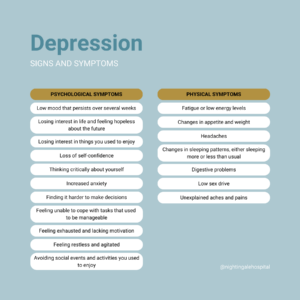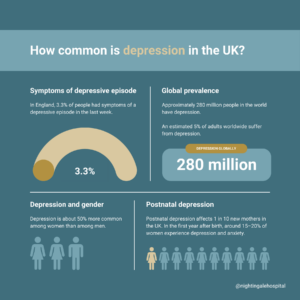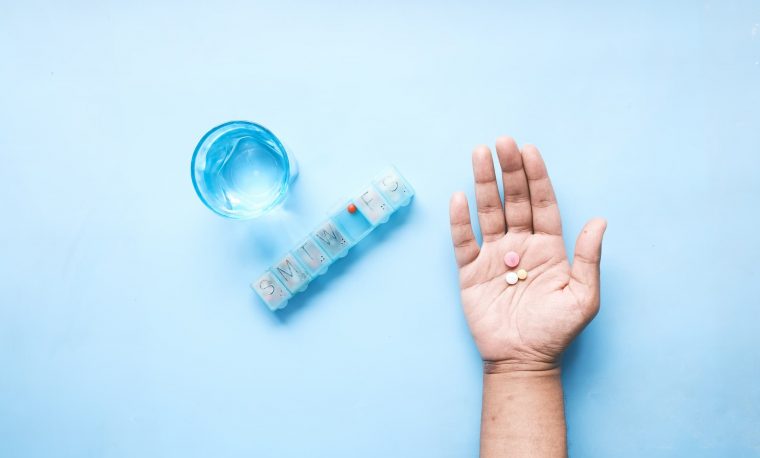Depression: What is it, symptoms, prevalence, causes, diagnosis and treatment
What is depression?
Feeling ‘down’ or unhappy are very common emotions that everyone will feel from time to time. Depression, however, is a mental health condition that is characterised by persistent feelings of sadness that affects the daily lives of those who experience it.
Many things can cause depression; such as stressful or triggering life events (for example, the loss of a loved one, job loss, divorce or separation), family history and genetics or giving birth. The severity of depression will also vary from one individual to another.
Treatment for depression usually involves a combination of lifestyle changes, talking therapies and medication. With the right treatment, people with depression can make a full recovery.
Get support for depression
Our team is available for a confidential conversation about what you are experiencing and how we can support you. Complete the enquiry form below and our team will be in contact with you.
Symptoms of depression
The feeling of depression is deeper, longer and more unpleasant than the short episodes of unhappiness that everyone experiences occasionally.
Psychological symptoms of depression:
- Low mood that persists over several weeks
- Losing interest in life and feeling hopeless about the future
- Losing interest in things you used to enjoy
- Loss of self-confidence
- Thinking critically about yourself
- Increased anxiety
- Finding it harder to make decisions
- Feeling unable to cope with tasks that used to be manageable
- Feeling exhausted and lacking motivation
- Feeling restless and agitated
- Avoiding social events and activities you used to enjoy
Physical symptoms of depression:
- Fatigue or low energy levels
- Changes in appetite and weight
- Headaches
- Changes in sleeping patterns, either sleeping more or less than usual
- Digestive problems
- Low sex drive
- Unexplained aches and pains

How common is depression?
- Approximately 280 million people in the world have depression.1
- Globally, an estimated 5% of adults suffer from depression.1
- In England, 3.3% of adults have experienced symptoms of depression in the last week.2
- Depression has an average lifetime prevalence of 12%, with estimated ranges between 5% and 17%.3
- Depression is about 50% more common among women than among men.1
- Postnatal depression affects 1 in 10 new mothers in the UK.4 In the first year after birth, around 15–20% of women experience depression and anxiety.5

Do I have depression?
If you are experiencing symptoms of depression, it might be time to speak with a mental health professional. We have a range of consultant psychiatrists who can provide assessment, diagnosis and an individualised treatment plan for you.
Our team are here to walk you through this process and match you with a suitable psychiatrist.
Types of depression
There are many different types of depression. However, the main type of depression that we treat is major depressive disorder.
- Major depressive disorder: Also referred to as clinical depression, this type of depression is a mood disorder that lasts for weeks, months or longer and affects your daily life. You may be feeling unhappy, hopeless or finding no pleasure in activities you usually enjoy.
- Persistent depressive disorder (PDD): Persistent depressive disorder is a mild or moderate, but long-lasting, form of depression that lasts for two years or more. The symptoms are generally less severe than major depressive disorder.
- Antenatal or postnatal depression: Antenatal depression occurs during pregnancy and postnatal depression occurs once a birth has taken place. Postnatal depression is generally more severe and longer-lasting that usually develops within six weeks after giving birth. Antenatal and postnatal depression are specific forms of major depressive disorder.
What causes depression?
It’s usually not possible to pinpoint depression to one singular cause. More often that not, it is a combination of several different factors. These can include:
- A significant life event: Such as a bereavement, divorce or job loss.
- Genetic and environmental factors: There is research which suggests that depression may be associated with several genes, but not caused by them. Rather, it is suggested that the interaction of genes and environmental factors may be an indicator of someone developing depression, not just genes alone.
- Physical health challenges: You may be at a higher risk of depression is you have chronic, long-term or serious physical health challenges such as chronic pain. In the same way, depression can cause chronic physical health challenges as a result rather than a cause.
- Traumatic events: If you have experienced a traumatic event, you may have developed prolonged trauma responses which means your nervous system is always in fight-or-flight mode. This exhausts your system and can lead to physical and mental health issues, including depression.
- Recently having a baby or finding out you’re pregnant: If you are experiencing symptoms of depression that coincide with a pregnancy or recently having a baby, it may be a sign of antenatal or postnatal depression.
- Medication: A common side effect of medication can be depression.
- Seasonal changes: Seasonal affective disorder is a mood disorder where individuals who typically have normal mental health throughout most of the year, but experience symptoms of depression that coincide with seasonal changes, usually winter.
- Other mental health conditions: If you experience another mental health condition, coping with this condition can mean you are more at risk of developing depression as well.
Diagnosing depression
If you are experiencing symptoms of depression, an assessment with a consultant psychiatrist will allow you a chance to discuss these symptoms with a mental health professional and put together an individualised treatment plan for you.
A consultant will ask about your medical history, including any history of other mental health concerns, your environment and lifestyle and how the way you’re feeling and symptoms you are experiencing is affecting your daily life. They may use a questionnaire to assess your symptoms and make a diagnosis.
Treatment for depression
If you’re experiencing symptoms of depression, it may be hard to imagine that treatment will help. But it can, and the sooner you seek help, the sooner you can start to see improvements.
Several different treatments for depression are available at Nightingale Hospital and after an assessment with a consultant psychiatrist, they will put together an individualised treatment plan for you. You can access treatment for depression as an outpatient, day patient or inpatient.
Talking therapy for depression
- Counselling enables you to talk about feelings to an objective mental health professional.
- Cognitive behavioural therapy (CBT) is goal-directed, systematic, and problem-solving therapeutic approach that focuses on how we think and act to help overcome and manage emotional difficulties.
- Interpersonal and dynamic therapy offers space for people to make sense of what they are doing by exploring ways of coping with difficulties and making useful changes to change their experience. Interpersonal therapies also offer a chance to understand your difficulties in relationships and ways to move forward.
Medication for depression
Antidepressants are a type of evidence-based medication used to treat clinical depression. They may help you feel less anxious, and cope with stressors better so you can start to enjoy life and deal with problems effectively again.
It’s thought that antidepressants work by increasing levels of chemicals in the brain called neurotransmitters. Certain neurotransmitters, such as serotonin and noradrenaline, are linked to mood and emotion.
Although antidepressants can be very effective in treating symptoms of depression, they often do not address the causes of depression. This is why they are often used in addition to talking therapies.
Lifestyle changes
Your consultant psychiatrist may speak to you about some lifestyle changes that can help with your symptoms of depression. This may include exercise, diet changes, sleep, stress reduction and social supports.
What is treatment-resistant depression?
Up to one-third of individuals with major depressive disorders will not respond to standard treatments. These individuals may be diagnosed with treatment-resistant depression (TRD).
At Nightingale Hospital, we offer a choice of highly specialised treatments, all of which have been proven to be effective in the management of treatment-resistant depression. To access these treatments, patients must be under the care of a Nightingale Hospital consultant psychiatrist.
- Repetitive transcranial magnetic stimulation (rTMS)is a non-invasive and medically safe method of brain stimulation. The basic principle of rTMS is to target short magnetic pulses over the scalp in specific brain regions that regulate mood. It is a medically safe treatment that has been evidenced to significantly decrease symptoms of depression, as well as OCD and addictions. Nightingale Hospital was the first hospital in the UK, to use the highly specialised and effective Deep TMS or ‘dTMS’ using an H-Coil.
- Electroconvulsive therapy (ECT) is a procedure, administered under general anaesthetic, that emits small currents throughout the brain, intentionally triggering a small seizure. ECT is known to cause changes in brain chemistry that can reverse some mental health conditions, specifically severe major depression. ECT is a medically safe and effective procedure. We have a formal agreement with the Central and North West London NHS Foundation Trust (CNWL), for the delivery of ECT. This agreement provides Nightingale Hospital patients with access to ECT treatment at Northwick Park Hospital, Harrow.
- Prescription nasal spray for treatment-resistant depression works to treat depressive symptoms by targeting numerous neural receptors in the brain. Nasal spray is used in conjunction with oral antidepressants and has been a licensed treatment in the UK since 2019. Nightingale Hospital was the first private hospital in London to offer this treatment. Prescription nasal spray has been proven to be safe and clinically effective in reducing depressive symptoms.
Support for depression
Depression is a crippling and debilitating condition, but we have seen countless people live a life they never thought possible while being equipped with strategies to manage their depression. Reach out to our team for a confidential discussion about the best path forward for you.
Helping a loved one with depression
Encourage them to connect with other people
Being with other people can be difficult when you are feeling depressed but talking to someone you trust about how you feel can help.
Encourage them to exercise
Exercise can improve motivation and energy levels. It also has a positive impact on sleep and mood.
Listen to them
Offer a listening ear, and make time to listen to problems and worries. Encourage activity and self-care including exercise, keeping a routine, eating well and getting enough sleep. Encourage them to visit their doctor, perhaps offer to go with them for support.
Useful resources
- World Health Organization, Depressive disorder (depression)
- NHS, Adult Psychiatric Morbidity Survey: Survey of Mental Health and Wellbeing, England, 2014, Chapter 2 - Common Mental Disorders
- National Center for Biotechnology Information, Major Depressive Disorder
- UK National Screening Committee, Postnatal depression
- National Institute for Health and Care Excellence, Depression – antenatal and postnatal: How common is it?











